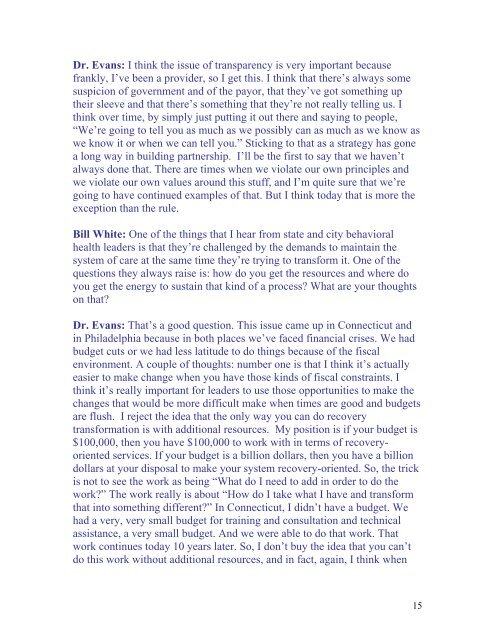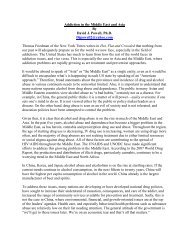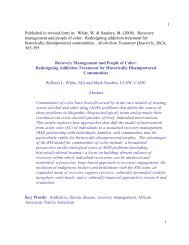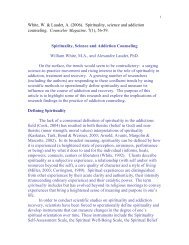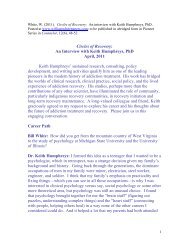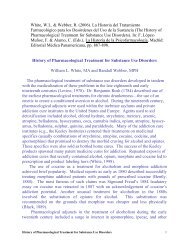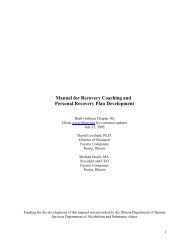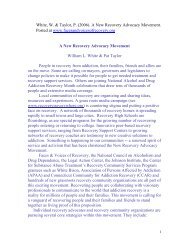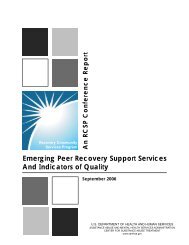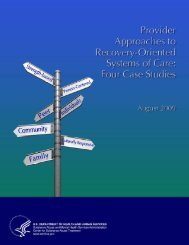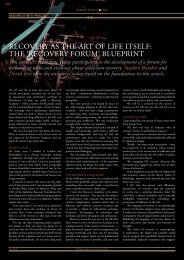An Interview with Arthur C. Evans, Jr., PhD Dr. Arthu - William L. White
An Interview with Arthur C. Evans, Jr., PhD Dr. Arthu - William L. White
An Interview with Arthur C. Evans, Jr., PhD Dr. Arthu - William L. White
- No tags were found...
You also want an ePaper? Increase the reach of your titles
YUMPU automatically turns print PDFs into web optimized ePapers that Google loves.
<strong>Dr</strong>. <strong>Evans</strong>: I think the issue of transparency is very important becausefrankly, I’ve been a provider, so I get this. I think that there’s always somesuspicion of government and of the payor, that they’ve got something uptheir sleeve and that there’s something that they’re not really telling us. Ithink over time, by simply just putting it out there and saying to people,“We’re going to tell you as much as we possibly can as much as we know aswe know it or when we can tell you.” Sticking to that as a strategy has gonea long way in building partnership. I’ll be the first to say that we haven’talways done that. There are times when we violate our own principles andwe violate our own values around this stuff, and I’m quite sure that we’regoing to have continued examples of that. But I think today that is more theexception than the rule.Bill <strong>White</strong>: One of the things that I hear from state and city behavioralhealth leaders is that they’re challenged by the demands to maintain thesystem of care at the same time they’re trying to transform it. One of thequestions they always raise is: how do you get the resources and where doyou get the energy to sustain that kind of a process? What are your thoughtson that?<strong>Dr</strong>. <strong>Evans</strong>: That’s a good question. This issue came up in Connecticut andin Philadelphia because in both places we’ve faced financial crises. We hadbudget cuts or we had less latitude to do things because of the fiscalenvironment. A couple of thoughts: number one is that I think it’s actuallyeasier to make change when you have those kinds of fiscal constraints. Ithink it’s really important for leaders to use those opportunities to make thechanges that would be more difficult make when times are good and budgetsare flush. I reject the idea that the only way you can do recoverytransformation is <strong>with</strong> additional resources. My position is if your budget is$100,000, then you have $100,000 to work <strong>with</strong> in terms of recoveryorientedservices. If your budget is a billion dollars, then you have a billiondollars at your disposal to make your system recovery-oriented. So, the trickis not to see the work as being “What do I need to add in order to do thework?” The work really is about “How do I take what I have and transformthat into something different?” In Connecticut, I didn’t have a budget. Wehad a very, very small budget for training and consultation and technicalassistance, a very small budget. <strong>An</strong>d we were able to do that work. Thatwork continues today 10 years later. So, I don’t buy the idea that you can’tdo this work <strong>with</strong>out additional resources, and in fact, again, I think when15


